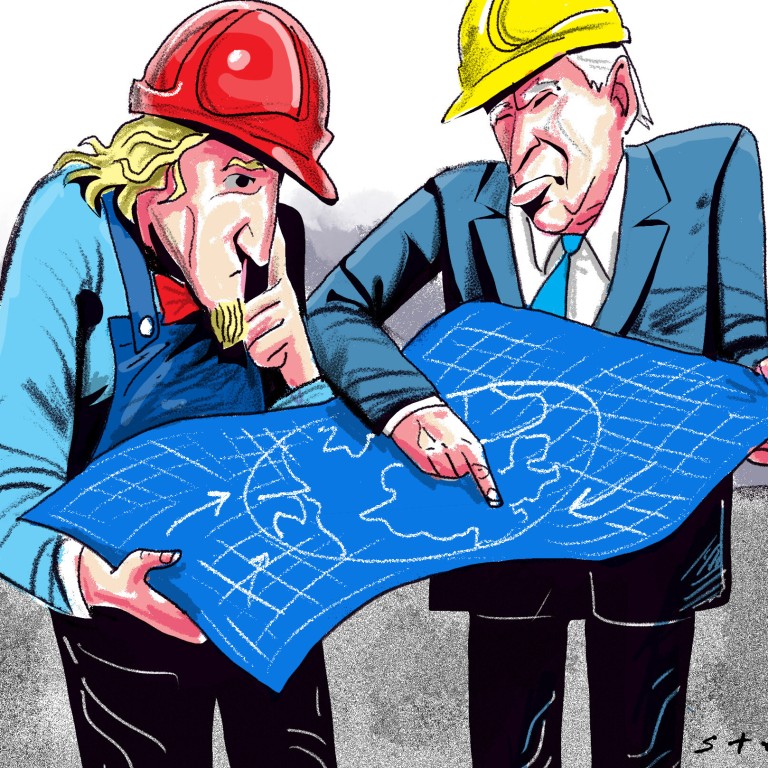
US should answer China’s challenge by delivering economic prosperity to its periphery
- America’s attempt to grapple with its illegal immigration problem may be less high-profile than Biden’s Europe tour, but it points to a better strategy for dealing with a rising China: focus on building decent lives for its people and others, as China has
I note, however, that US Vice-President Kamala Harris also just made her maiden visit abroad, to Guatemala and Mexico, to try to stem the influx of illegal immigrants from Latin America into the US. Last month, the number of undocumented migrants reaching America’s southern border was the highest in more than 20 years.
In the eyes of many, Biden’s visit to Europe, aimed at “rallying the world’s democracies” and seeking to smooth relations with Russia in America’s grand confrontation with China, carries a lot more geopolitical significance than Harris’s trip aimed at addressing a seemingly regional and domestic headache.
This is not the case, actually; the outcome of US-China rivalry could well be decided on just such an issue. Washington must make improvements in this area if it wants to win its high-stakes chess game with China: help sustain the livelihoods of the less-developed world, starting in its own neighbourhood.

The US admirably did this with its Marshall Plan for post-World-War-II Europe and with the remaking of Japan under General Douglas MacArthur’s stewardship. If today America finds China’s rise intolerable, it needs to repeat its Marshall Plan success with less-developed countries worldwide, in addition to its moralistic shouting.
This will change the awkward situation in which the emerging economies of the post-war years are largely found in the so-called “circle of Confucian culture” in East and Southeast Asia, China included of course.
So far, however, we have not seen much of that. In a sense, the Latin American economic boom in the 1970s could be seen as an American version of the Belt and Road Initiative, but it failed miserably as the debt crisis hit in the 1980s.
Americans shirked their responsibility by prescribing the Washington Consensus. Describing Latin American stagnation as a “middle income trap” only serves to cover up Washington’s unwillingness to really help the Latin Americans onto a sustainable path of economic development.
The mistake was repeated in Afghanistan and Iraq, where the slogans and attention were focused on the democratisation of the countries while America failed to do the dirty work of directing, organising and financing the locals to build the plants and shops needed for a decent life.
Meanwhile, the Chinese have been pouring investments into infrastructure construction and other projects in Central Asia, Africa and Latin America, bringing work opportunities and profit.
The US has accused China of predatory trade and finance practices, corruption of local politics, and making the host countries dependent on Beijing. But how far will US commitment go?
Harris’ trip to Mexico was dogged by questions of why she was not stopping at the US-Mexico border, where visceral scenes of migrants making the perilous crossing were unfolding daily. When challenged on this issue in an interview with NBC, she argued that she was in Guatemala and Mexico to address the root cause of the problem. She was right in this context.
America’s problem of illegal immigration is a symptom of its failure to do its duty and put in place conditions to allow the people in the vicinity of its hegemonic influence to live in sustained peace and reasonable abundance. This failure contravenes its own 200-year-old Monroe Doctrine, which laid the foundation of America’s global supremacy and its much trumpeted value system.
The fact Harris was stiff-armed by a reporter about a border visit shows just how the issue continues to be politicised in the US. This is disappointing but understandable – even Samuel Huntington, mindful of the clash of civilisations, was obsessed with the “invasion” of illegal immigrants into US territory.
But the stakes are high. The world we live in is no longer one of a Roman empire living on the tributes offered by its garrisoned subject territories, nor one dominated by the British Empire, which was maintained with prudential colonial rules and the sinews of modern industry.
And it is no longer plausible for America to seek to preserve its supremacy the way it has for the past 50 years: manoeuvring the US dollar as the world currency, underpinned by its unrivalled military power.
Terry Su is president of Lulu Derivation Data Ltd, a Hong Kong-based online publishing house and think tank specialising in geopolitics


